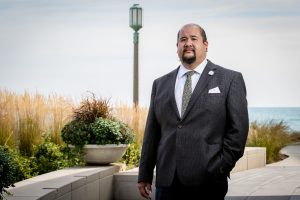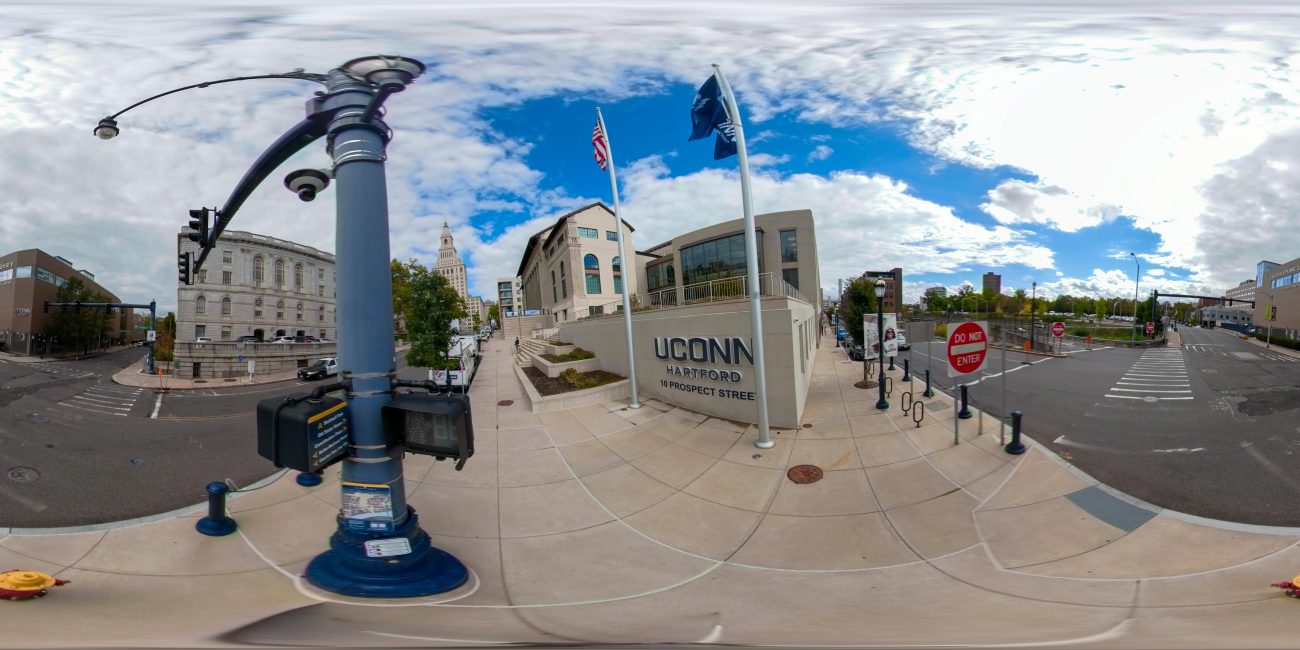When Hurricane Ida brought devastating winds and rain across the United States last week, it not only presented an immediate threat to life and safety, it revealed deep and abiding structural problems in cities as diverse as New Orleans and New York: infrastructure, public transit, racial discrimination in housing, public communication, and more were all thrown into sharp relief by the record-breaking storm.
Understanding these types of complex challenges – and learning how they can best be addressed – is the mission of the Sustainable Global Cities Initiative at UConn Hartford. An interdisciplinary research unit that examines challenges in cities here in Connecticut, as well as nationally and globally, the initiative seeks to develop new models of democratic, healthy, and sustainable urban living in partnership with public and private organizations.
Having recently obtained stable funding for the next five years, the SGCI also recently named its first permanent director: David G. Embrick, associate professor of sociology and Africana Studies. An authority on the impact of contemporary forms of racism on people of color, Embrick has published extensively on inequalities in the business world, race and education, the impact of schools, welfare, and prisons on people of color, and gender discrimination. Prior to arriving at UConn, he spent a decade at Loyola University Chicago, where he was able to research challenges to urban living in one of the country’s biggest cities. Recently, Embrick spoke with UConn Today about his vision for the Sustainable Global Cities Initiative, the importance of interdisciplinary research, and the challenges that unite cities large and small. The conversation has been edited and condensed for clarity.
The Sustainable Global Cities Initiative is fairly new to UConn, having been founded about three years ago. Could you talk about what the initiative does, and how it fits into UConn’s overall mission?
It’s a new initiative that seeks to use research from across a broad range of disciplines to explore the challenges of living in a city in the 21st century in a way that can really affect the everyday lives of people. The immediate goal is to become the hub of research and information-gathering here in Hartford, then connecting with other cities in Connecticut, and with a long-term objective of national and even global collaboration.

What that means for UConn is that we need to highlight our faculty and their research to the community at large, not just to showcase our research, but to offer the University as a resource to get the kinds of data and information the community needs. It’s about working collaboratively with the community: we assess their needs through their words and what they’re telling us, and then we work to provide them with information that will inform their decision-making. The idea is a partnership between city constituents and UConn faculty. We want to be the go-to place for research needs, first in Hartford, and then in cities like Bridgeport and New Haven. Eventually the goal is to connect with similar urban research units around the country and the world. There’s a real need for collaboration like this.
What was it about the SGCI that made you want to get involved as the director?
I have long had research interests that align with the initiative. When I was at Loyola University Chicago, I worked with the Center for Urban Research and Learning. After I came to UConn, I spent some time as a visiting senior analyst at the University of Illinois at Chicago Institute for Research on Race and Public Policy, so for me this was a good fit. I also like that there’s a challenge in building something new. Right now, we’re an initiative rather than a center or institute, and one of the goals is to become a center. But while it’s a challenge, it’s not a hardship, because the former interim director, Robert Wilson, and office manager, Rachel Smith Hale, did such an amazing job in three years of laying the foundation for SCGI. They did so much with limited resources, and now the challenge is to see what we can accomplish in five years.
When we talk about the challenges cities are facing, what kinds of things are we looking at?
It varies from city to city, of course, but one thing we focus on is sustainability. That can mean environmental sustainability, but it can also mean the challenges of existing inequalities to the way people live in cities. Inequalities due to racism, inequalities with regards to people with disabilities, all present challenges to creating the kind of city where everyone can live in an environment where they feel safe and healthy.
Another challenge is growth, and what growth looks like for different communities in a city. One of the bigger challenges on the East Coast is affordable housing, when you have one kind of growth that means gentrification, rising costs of living, and people being driven out of neighborhoods.
When you look at what the hurricane this past week did, that’s just the latest example of these storms and extreme weather events that present challenges people hadn’t even considered. Look at the ice storm in Texas last winter, where the problems were compounded by policy decisions and infrastructure choices going back decades in some cases.
That’s one area UConn can play a role in – not just defining current challenges, but predicting future challenges, and helping city leaders think about the long term. That’s one of the things I really value about this initiative – it requires us to get out in the community, talk with people, listen to people, and understand their needs. People see academics as insular, self-centered, not really privy to the realities of life, and we can change that impression with our work. If we work together – researchers, community members, city leaders – we can deal with any challenge. That’s the key.
How will you know in five years if the initiative is succeeding?
Success looks like this: folks from the community reaching out to us for their research needs. When the community starts to see us as a resource they can rely, when we become a hub for all types of information and data-gathering, that’s when we’ll know we’re successful. To do that, we have to become sustainable on a long-term basis, as a center. UConn has invested in the initiative because the University believes in its objectives, but we need to make sure we have the resources to be effective and viable in the long run.
Also, we need to get the word out. A lot of what we’re doing right now is outreach, not just to the community, but to researchers and scholars. So if you’re faculty member or researcher interested in urban topics, we welcome you, we would love to hear from you, and you should feel free to reach out to me. If you’re a community member in Hartford and want to find out more, I welcome any questions or even just a conversation. We’re open, we welcome you, and we want to talk about what we can accomplish together.
Visit the Sustainable Global Cities Initiative online: https://cities.hartford.uconn.edu/



